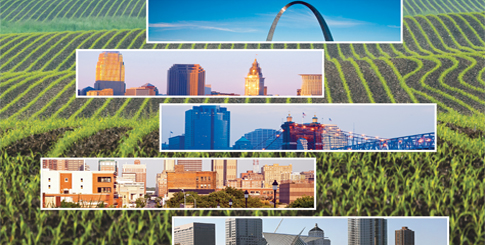As consumers continue to demand more fresh produce beyond traditional local seasons, Midwest growers, receivers, and retailers are ready and willing to tackle the challenge. Of course, only part of the Midwest’s fresh produce comes from outside the area, reaching markets in the six cities profiled here (Cincinnati, Cleveland, Des Moines, Indianapolis, Milwaukee, and St. Louis)—as there is plenty of seasonal volume from local growers, especially in Ohio and Michigan.
“As technology has improved, more farmers in this area have been able to invest in tools that allow for prolonged growing seasons,” explains Daniel Corsaro, executive vice president of sales and marketing for Indianapolis Fruit, Inc., in its namesake city.
Not only are growers able to lengthen the season, but they’re winning a few battles against the effects of adverse weather too, with newer varieties and protective measures in the field. One such measure is the use of hoop houses to shield crops from wind, rain, or hail damage.
Sam Maglio, Jr., president of Maglio & Company in Milwaukee, sources from urban farming operations that produce with the wholesaler in mind, rather than selling at farmers’ markets or through community supported agriculture (CSA) subscription programs. “We can get organic basil from a warehouse-based tilapia farm and microgreens from Growing Power’s local hoop houses,” Maglio says.
To learn more about top crops, terminal markets, and the many advantages of buying and selling fresh fruits and vegetables in the Heartland of the United States—read on.
A is for Advantages
Receiving and distributing produce from the Midwest is all about location. The same roads and railways that take the region’s massive corn and soybean crops across the nation can move perishables with ease, especially from Texas and the Southeast.
With good reason Indiana’s state motto is “The Crossroads of America,” and all six markets enjoy easy access in the Midwest with major highways from east to west. “We are centrally located and at the crossroads of Interstates 35 and 80, which gives us a logistical advantage,” points out Brendan Comito, COO of Capital City Fruit Company, Inc. in Des Moines.
Being located in the center of the country also helps increase the supply of imports, especially those trucked in from the East Coast and Mexico via Texas. Wholesalers balance rising shipments from importers with domestic supply to benefit Midwest retailers, foodservice operators, and ultimately consumers—all seeking more year-round produce. In some cases, Midwest receivers are extending their reach and establishing their own facilities at ports of entry. One is Maglio & Company, which opened an office in Texas. “We’ve seen a spike in our imports from Mexico since we established our presence in McAllen,” confirms Maglio.



